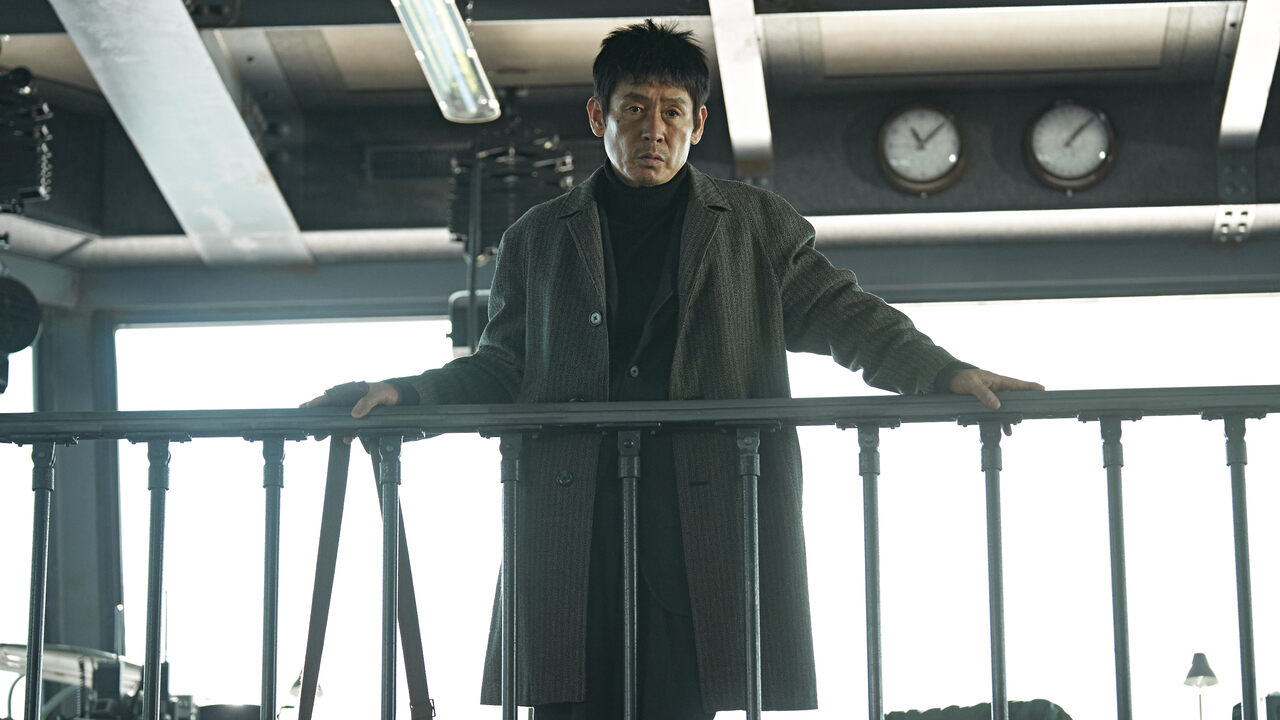
Pay attention to these two lines from Good News/Gut Nuiuseu (on Netflix from October 17), a new black comedy directed by Byun Sung-hyun: "Reality's completely relative. It can appear and disappear just as quickly. All you need is a bit of creativity," and "Take what happened and add a little creativity and a desire for truth. If these things come together..." the character, then, snaps his fingers, and the crowd starts screaming vehemently in unison. Why are they screaming? I will leave it for you to find out. For now, focus on the lines I quoted. They are important because they can be considered as Sung-hyun's manifesto — or at least, those are the rules he follows for Good News. He takes a real-life incident (the 1970 hijacking of a Japanese passenger plane, aka the Yodogo Incident) and charges it with his creative fervor. He also instills in us a desire for the truth, as evidenced by the fact that the first thing I wanted to know was whether a South Korean airport had been temporarily modified to resemble a North Korean one during the actual event. Still, one shouldn't watch Good News for concrete facts regarding the 1970 hijack. Hard facts are the domain of sober documentaries; fictional re-creations/adaptations thrive on the filmmaker's imagination. Sung-hyun sees the hijack as a starting point for exposing the people's incompetence. He turns almost everyone into a target for satire.
The movie is divided into different chapters, and each chapter comes with subtle yet crucial tonal changes. Good News starts as a comedy of hilarious proportions. A co-pilot, Maeda (Kim Sung Oh), tells his captain, Kubo (Shiina Kippei), to take his hemorrhoids as a badge of honor. The hijackers, led by Denji (Kasamatsu Sho) and his deputy Asuka (Yamamoto Nairu), take control of the plane, but without doing basic research. Hence, they don't know how to check the fuel gauge or how flights navigate to their destinations, making it easier for the pilots to deceive them and make a stop at Itazuke Airport. The concerned authorities, the air force officers, are no better. They discuss their plans using a diagram of a plane that resembles a sausage with two wings attached. It's here that we get the film's funniest joke when a character in a wheelchair reminds everyone that his company's slogan is "Safe as a home in the sky," and a man replies, "People die in their homes all the time." Everybody rightly complains nowadays about too much corruption, about how those in power have become careless and irresponsible. With Good News, Sung-hyun says that individuals in positions of power have always been corrupt and insouciant. Whether it's the public or the government, people always seem to need emotional appeals to take action. It's only when victims share their horrific experiences that citizens unite to pressure the government — and only then does the First Lady, in the film, visit the site of the incident. This is why the scene in which the chaos inside the plane is juxtaposed with the pin-drop silence outside feels like more than just an instance of visual humor.
Sung-hyun, at first, tries to keep the jokes at the narrative level. Someone gives an English translation of "Oh yeah yeah yes," and a "fight" between two air traffic controllers is depicted like a scene out of a Western. However, the humor slowly trickles down from the story and settles firmly on the characters. As a result, you begin to see the characters—mostly high-ranking government officials—as jokers, and these jokers come to dominate a story that no longer merely wants you to laugh but also aims to reveal how pusillanimous your leaders are. They point fingers at each other when it comes to taking the blame, and don't hesitate to take credit for work they have not done. Sung-hyun also conveys something else. In Good News, Japan and South Korea seem more concerned with showing off their might than with the safety of the passengers. The implication is quite straightforward: reputation takes precedence over citizens.
Good News gives you plenty to chew on, but it's not always engaging to watch. It even becomes tedious in the latter parts (this is due to the "trickling down" of humor, as mentioned above). Sung-hyun is too self-indulgent; a firmer editorial hand could have shown him which scenes to tighten. For example, the scene in which Denji takes a quiz and asks someone if they're in North Korea drags on too long. And yet, you can't help but admire Sung-hyun's ambition. We're generally willing to forgive his excesses, probably because the message he delivers is strong: the world is saved by people whose names never appear in the news and who never receive medals. The lower-ranking man makes the sacrifices, putting everything on the line for the sake of his country and his superiors. It is a nobody who brings the good (and bad) news, after all.
Final Score- [6/10]
Reviewed by - Vikas Yadav
Follow @vikasonorous on Twitter
Publisher at Midgard Times
Release Date: October 17, 2025, on Netflix
Hi Everyone, after a due consideration, we have decided that we will be open for donations to help us in managing our website. We will be greatful for any kind of amount we receive. Thanks!
— Midgard Times 🎬 (@Moviesr_net) January 4, 2026
PayPal- [email protected] pic.twitter.com/DlNNz5Npm5
Get all latest content delivered to your email a few times a month.
Bringing Pop Culture News from Every Realm, Get All the Latest Movie, TV News, Reviews & Trailers
Got Any questions? Drop an email to [email protected]